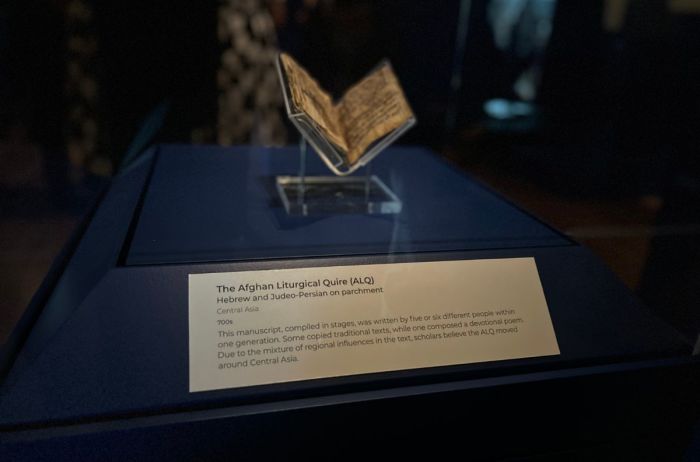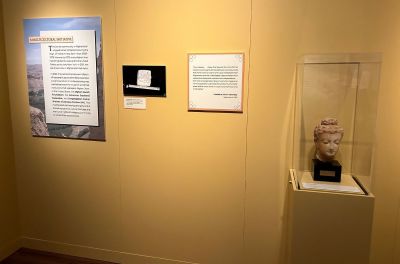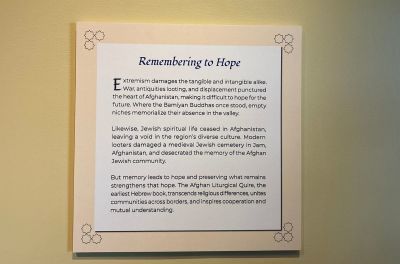World's oldest Hebrew book unveiled at Museum of the Bible after being found in Afghanistan cave

WASHINGTON — A new exhibit at the Museum of the Bible displays one of the oldest Jewish books discovered in Afghanistan, which contains prayers and poems based on texts from the Old Testament and serves as an example of the country’s diverse and accepting culture that runs contrary to what most people believe about the region.
Researchers estimate that the book, known as the Afghan Liturgical Quire, is around 1,300 years old. A relic of the ancient Silk Road trading route, the book is 5 inches by 5 inches and contains prayers, poems and what is reportedly the oldest known version of the Haggadah, a text recited at the Seder during Passover. The Passover Haggadah is mysteriously written upside down.
Late last month, the Museum of the Bible celebrated the opening of a new exhibit featuring the book titled “Sacred Words: Revealing the Earliest Hebrew Book.” The exhibit, which opened on Sept. 24, will remain at the museum until January 2025. One of the book’s next stops after the Museum of the Bible is the library of the Jewish Theological Seminary in New York.
The prayers and poems in the book are from the Hebrew Bible. The book was created by a Jewish community living as a minority among Buddhists who ruled the Bamiyan Valley, which is known as Afghanistan today, according to the museum.

The museum’s claims about the book featured in its new exhibit are based on the work of a team of researchers, whose findings will be published by Dutch publisher Brill in April.
Herschel Hepler, Museum of the Bible’s associate curator of Hebrew manuscripts and curator of the new exhibit, told The Christian Post that much of the Western world and media outlets have misunderstood Afghanistan’s true culture. The curator said that extremist groups like the Taliban, which returned to power in 2021, do not represent the “heart” of the country.
For thousands of years, Christians, Jews and Muslims moved through Afghanistan safely, according to Hepler. The kindness and hospitable nature of the Afghan people goes back to the Silk Road, Hepler said, of which the modern nation of Afghanistan was a major thoroughfare.
Despite the news cycle’s portrayal of Afghanistan as a place of constant war and turmoil, Hepler stated that the country’s people are “unbelievably kind.” He hopes those who visit the new exhibit will better understand Afghanistan’s culture.
“I went through that transformation and understanding process, and I hope that anyone visiting this exhibit will also experience that kind of broadening of your perspective about Afghanistan’s diverse history,” Hepler said.
The curator of the Sacred Words exhibit has researched Afghan Liturgical Quire for eight years. It took another two years to put the exhibit together.

The discovery of the ancient book goes back to 1997 when a Hazara man found it in a cave. Hazarans are an ethnic minority group in Afghanistan, and they protected the book until 2001.
In 2013, the Green family, who own the Hobby Lobby chain and helped found the Museum of the Bible, came to possess the book after purchasing it from an Israeli dealer. Unaware of what it was, the Hobby Lobby owners gave it to the museum in 2015.
The book was added to a collection where it was mislabeled as “Egypt, circa 900 CE” before the museum scholars realized the significance of the latest acquisition.
From 2018 to 2021, the museum built a research project with various institutions representing Afghan Jews, including the Afghan Jewish Foundation and the American Sephardi Federation. Officials belonging to Afghanistan’s former government also contributed to the project, according to Hepler.

As the curator explained, Afghanistan was hit hard by the COVID-19 pandemic in 2020. Then, in 2021, the Taliban seized control of the country again after the United States withdrew its military presence from the nation.
If not for these issues, Hepler believes the exhibit would have opened a lot sooner.
At this time, the officials from Afghanistan’s former government wish to remain nameless as the country continues to suffer under the Taliban’s rule.
“These Afghan officials involved in the project are still finding time to think about the human rights of a displaced religious community to access a sacred book,” Hepler said. “The fact that they were still thinking about this and this is still a priority for the government is just a testament to the kindness of the people of Afghanistan.”
Samantha Kamman is a reporter for The Christian Post. She can be reached at: samantha.kamman@christianpost.com. Follow her on Twitter: @Samantha_Kamman





























